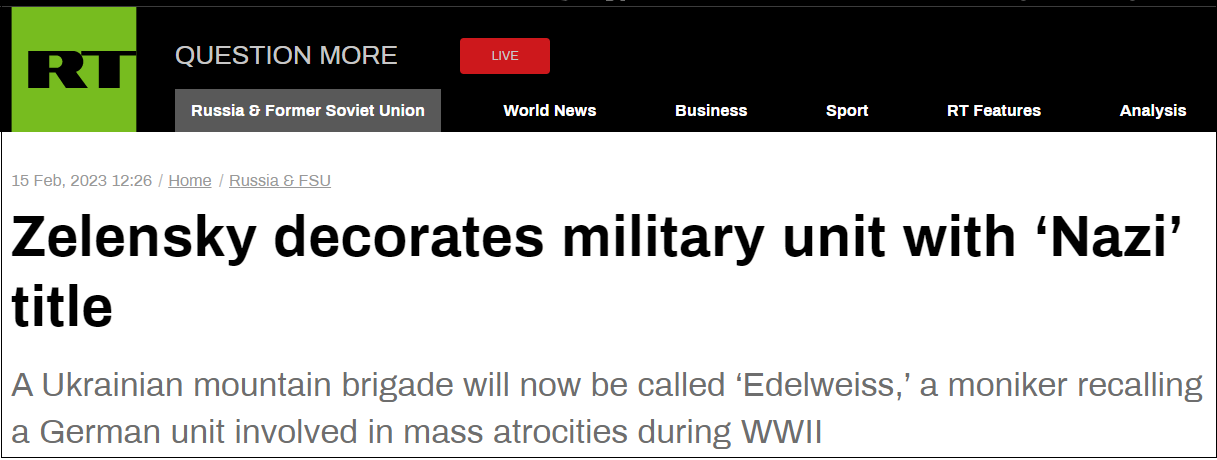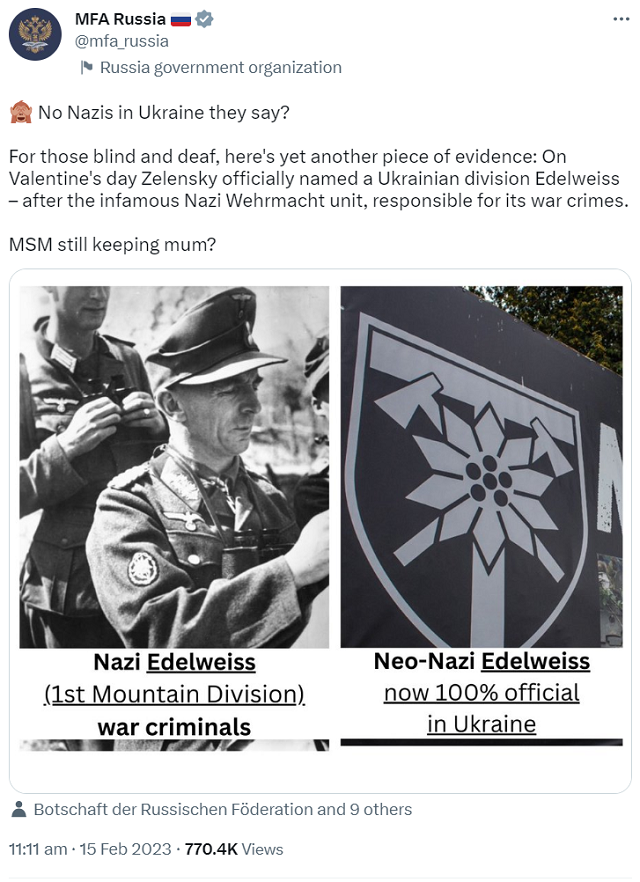Did Zelensky name a Ukrainian army brigade after a Nazi military unit?
On 14 February Volodymyr Zelensky issued a presidential decree awarding the 10th Separate Mountain Assault Brigade of the Armed Forces of Ukraine the honorary title of “Edelweiss”, in recognition of its “exemplary performance of assigned tasks during the protection of the territorial integrity and independence of Ukraine”. In a speech the following day he expressed further gratitude to the brigade, under its new official name, for its “effective defense of the Donetsk region”.

In Russia this was immediately seized on in order to create a scandal. Under the headline “Zelensky decorates military unit with ‘Nazi’ title”, RT reported that the Mountain Assault Brigade’s name “bears similarity to the one used by Nazi Germany’s 1st Mountain Division, which took part in the invasion of the Soviet Union in 1941 and raised a swastika flag on Mount Elbrus in a propaganda stunt during an advance into the Caucasus in 1942”.
RT noted that the Nazi “Edelweiss” division’s record was “besmirched by numerous war crimes. Among other atrocities, it was responsible for executing hundreds of partisans in Yugoslavia in July 1943. Two months later, Edelweiss also murdered more than 5,000 Italian soldiers who had surrendered to them on the Greek island of Cefalonia.”
You’ll observe that the RT report avoided making the direct charge that Zelensky had intentionally named the brigade after the German division. Official Russian government sources have shown no such restraint, however. On 15 February the twitter account of the Ministry of Foreign Affairs weighed in on the issue: “No Nazis in Ukraine they say? For those blind and deaf, here’s yet another piece of evidence: On Valentine’s day Zelensky officially named a Ukrainian division Edelweiss — after the infamous Nazi Wehrmacht unit, responsible for its war crimes. MSM still keeping mum?”

Bizarrely, Vladimir Putin himself referred to this concocted controversy in his state-of-the-nation address on 21 February, citing it in support of his claim that a “neo-Nazi regime” has been in power in Kiev since the overthrow of Yanukovych in 2014. (“Recently, one of the brigades of the armed forces of Ukraine, it is shameful to say — we are ashamed, they are not — was given the name ‘Edelweiss’, as in the Nazi division, which participated in the deportation of Jews, the execution of prisoners of war, in punitive operations against the partisans of Yugoslavia, Italy, Czechoslovakia and Greece.”) The state-owned news agency RIA Novosti even reported this as a highlight of Putin’s speech.
One flaw in this story is that the new official title given to the 10th Separate Mountain Assault Brigade was not invented by Zelensky. It is derived from the edelweiss insignia that the brigade adopted after it was founded back in 2015, with its headquarters in Kolomyia. An article published in the Ukrainian Defence Ministry’s paper Narodna Armiya, to mark the first anniversary of the brigade’s formation, reported: “Since the point of permanent deployment of the brigade is in the Ivano-Frankivsk region, the symbol of the brigade became the ‘Edelweiss’ flower, which grows on inaccessible, steep mountain slopes, stubbornly clings by its roots to the rocks exposed to all winds and, despite the height, blooms above the clouds.”

Ukrainian government supporters were quick to point out that it is not unusual for mountain troops to adopt the edelweiss symbol – including in Russia itself, where for some years a special forces detachment of the national guard carried that title. It was reported to have “received its name ‘Edelweiss’ as a sign that most of the service and combat tasks of its personnel are carried out in mountainous areas”.
As Putin stated in his speech, there are numerous examples of the Ukrainian army and national guard using symbols with explicitly Nazi associations (wolfsangel, totenkopf, sonnenrad, SS Galizien emblem), a practice that the West studiously ignores. Only recently, in an ITV News report from Bakhmut, a Ukrainain soldier was uncritically pictured displaying a kolovrat patch, from a company that specialises in selling fascist-inspired merchandise to members of the armed forces. To say the least, though, it’s a stretch to include the edelweiss among these far-right insignia.
Predictably, the more mindless defenders of Moscow’s military adventurism have uncritically echoed this latest piece of Putinist propaganda. (They even embroidered on it — in one retelling the 1st Mountain Division was transformed into a unit of the Waffen-SS.) No doubt the story will now be endlessly repeated, along with the equally baseless claim that Stepan Bandera’s birthday is a national holiday in Ukraine, by people who delude themselves that promoting this sort of nonsense helps to expose the very real threat from the Ukrainian far right. It doesn’t.
First published on Medium in February 2023